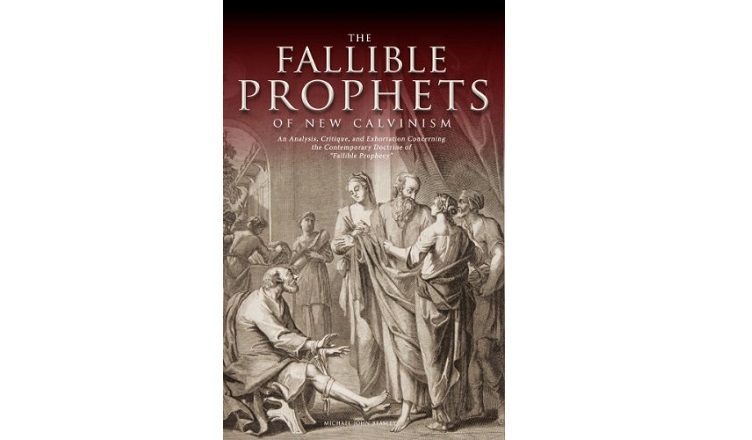 Have you ever heard your church minister claim God was speaking through him? Has he ever claimed to be a prophet? This book attempts to address this issue.
Have you ever heard your church minister claim God was speaking through him? Has he ever claimed to be a prophet? This book attempts to address this issue.
Beasley examines Wayne Grudem’s controversial teaching on fallible prophecy. A fallible prophet claims to speak with the authority of God, yet acknowledges their message contains both truth and error. Supposedly this teaching is popular among the ‘New Calvinism’ movement and in addition to Grudem promoted by D.A. Carson, John Piper, and Mark Driscoll.
At the heart of this book is the debate between cessationism and continuationism.
- Link: Amazon
- Length: 180
- Difficulty: Medium
- Topic: Theology, Prophecy, Special Revelation
- Audience: Mainstream Christians
- Published: 2014
Cessationism is the doctrine that spiritual gifts such as speaking in tongues, prophecy and healing ceased with the original twelve apostles. This is generally opposed to continuationism, which teaches that the Holy Spirit may bestow the spiritual gifts on persons other than the original twelve apostles at any time.
I don’t have a great deal of love for ‘New Calvinism’, but I do believe God still empowers his people with speaking gifts today. Here is a bit on the content of the book.
This post is one of my book reviews.
Contents – Overview
- Introduction: A Primer on Prophecy
- Chapter 1: Prophecy – A Test of Love
- Prophecy and the Nature of God
- Prophecy – A Test of Love
- Chapter 2: Fallible Prophecy – Lexical Concerns
- Grudem’s Lexical Treatment of prophetes
- Other Lexical and Syntactic Concerns
- Chapter 3: – Fallible Prophecy – The Case of Agabus
- Historical Background of Paul’s Arrest
- Three Main Views of paradidomi
- Some Practical Implications of Fallible Prophecy
- Chapter 4: Fallible Prophecy – A Gift for All?
- Paul’s Broader Ministry to the Corinthians
- Key Exegetical Issues
- Conclusion: The Fallible Prophets of New Calvinism
Main points
Beasley begins his argument against fallible prophecy by citing the text given in the Old Testament to validate prophets.
20 But the prophet who presumes to speak a word in my name that I have not commanded him to speak, or who speaks in the name of other gods, that same prophet shall die.’ 21 And if you say in your heart, ‘How may we know the word that the LORD has not spoken?’— 22 when a prophet speaks in the name of the LORD, if the word does not come to pass or come true, that is a word that the LORD has not spoken; the prophet has spoken it presumptuously. You need not be afraid of him. (Dt 18.20-22)
He argued quite rightly from the text, the presence of error is an indication that they not fear that man, nor think he speaks from God. In fact they are to stone them to death!
Eventually he considers Grudem’s argument based on the Acts accounts of a prophet named Agabus (Acts 11.28; 21.10f). I’ve never given him much thought until this book.
10 While we were staying for many days, a prophet named Agabus came down from Judea. 11 And coming to us, he took Paul’s belt and bound his own feet and hands and said, “Thus says the Holy Spirit, ‘This is how the Jews at Jerusalem will bind the man who owns this belt and deliver him into the hands of the Gentiles.’ ” 12 When we heard this, we and the people there urged him not to go up to Jerusalem. (Acts 21.10-12)
Grudem and Carson claim Agabus’ prophecy contains errors. Yet he is still considered a prophet. Beasley considers Agabus himself within the larger context of Acts and argues Agabus’ prophecy is free of error. Clearly they have different interpretations. Personally I’m more inclined to believe a prophecy is true in some way using the hermeneutical rule – ‘Analogy of faith’.
Beasley eventually considers what some contemporary advocates have said about it. He argues if churches were lead to believe their minister spoke God’s word and his word contained both truth and error this would malign God’s character, confuse them and inevitably damage the church.
Beasley doesn’t call these people fallible prophets. He calls them false prophets and says they are within the church.
Recommendation
I mentioned before, I do believe God still empowers his people with speaking gifts today. I hope and pray God speaks through me as an evangelist. As Paul encouraged the Corinthians (1 Cor 12.31) that is the gift I want. This blog is the primary way I hope this gift will be manifested.
So while there is merit to some of Beasley’s polemic, he has not convinced me to become a Cessationist.
That being said I am less inclined to assume God is speaking through me, either when I blog or speak to others about Jesus. I sincerely hope he does! But I do not assume he does. The Spirit blows where he wants (Jn 3.8).
I think it would be sheer presumption and arrogance teach or instruct others that God was speaking through me all the time or on demand. This is what some preachers do today. May God forgive them.
I would not recommend this book to a church goer unless their church leaders were openly advocating fallible prophecy.
Copyright © Joshua Washington and thescripturesays, 2016. All Rights Reserved.





